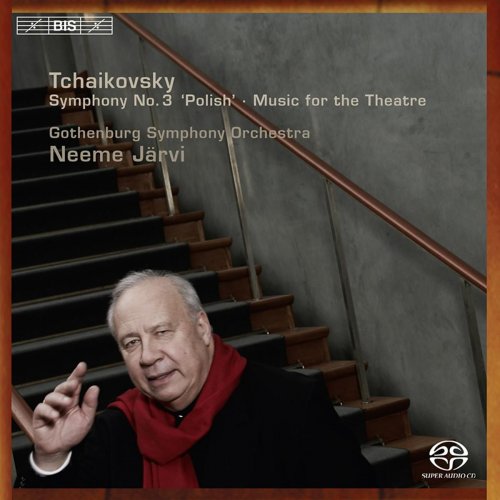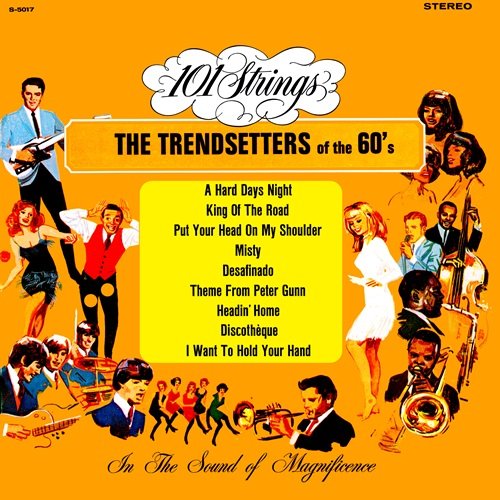Gothenburg Symphony Orchestra, Neeme Järvi - Tchaikovski: Symphony No. 3, "Polish", Eugene Onegin (excerpts),The Voyevoda (excerpts) (2009)

Artist: Gothenburg Symphony Orchestra, Neeme Järvi
Title: Tchaikovski: Symphony No. 3, "Polish", Eugene Onegin (excerpts),The Voyevoda (excerpts)
Year Of Release: 2009
Label: BIS
Genre: Classical
Quality: FLAC (tracks)
Total Time: 01:16:49
Total Size: 372 Mb
WebSite: Album Preview
Tracklist: Title: Tchaikovski: Symphony No. 3, "Polish", Eugene Onegin (excerpts),The Voyevoda (excerpts)
Year Of Release: 2009
Label: BIS
Genre: Classical
Quality: FLAC (tracks)
Total Time: 01:16:49
Total Size: 372 Mb
WebSite: Album Preview
Symphony No. 3 in D Major, Op. 29, "Polish"
1. I. Moderato assai - Allegro brillante 13:12
2. II. Allegro moderato e semplice 06:36
3. III. Andante elegiaco 08:21
4. IV. Scherzo 06:05
5. V. Allegro con fuoco 08:50
Voyevoda, Op. 3
6. Entr'acte and Dances of the Chambermaids 10:01
Dmitry the Pretender and Vasily Shuysky
7. Introduction 03:55
8. Mazurka 02:56
Serenade for Nikolay Rubinstein's Nameday
9. Serenade for Nikolay Rubinstein's Nameday 03:22
Eugene Onegin, Op. 24, TH 5, Act II, Act II Scene 1
10. Entr'acte - Waltz 07:56
Eugene Onegin, Op. 24, TH 5, Act II, Act III Scene 1
11. Polonaise 05:35
Performers:
Gothenburg Symphony Orchestra
Neeme Järvi
This BIS disc completes the cycle of Tchaikovsky symphonies performed by Neeme Järvi and the Gothenburg Symphony with the Third Symphony, the so-called "Polish," because of its polka finale. Like previous issues in this series, Järvi has included a generous assortment of shorter works to fill out the disc, including the Waltz and Polonaise from the opera Eugene Onegin, along with several rarities: the Entr'acte and Dance of the Chambermaids from the early opera The Voyevoda, the Introduction to Act I and the Mazurka from the early incidental music for Dmitri the Pretender and Vassily Shuisky, and the Serenade for Nikolai Rubinstein's Name Day. As before in this series, BIS has provided Järvi and the Gothenburg with "you are there" super audio sound of staggering impact and fidelity.
The performances, like the earlier ones in the series, are vigorous but decidedly uninspired. Järvi is clearly a seasoned and skillful conductor who knows how to get the best out of the orchestra, and the Swedish musicians are only too happy to give him not just their best but everything he asks of them, which is where these performances fall down. Järvi's readings have plenty of energy but little identity, and lots of strength but much less insight. In the symphony, the music sounds curiously unlike Tchaikovsky. The introductory Tempo di Marcia funèbre is too light, the central Andante elegiaco lacks molding, the Scherzo is rhythmically flat-footed, and the closing Polka con fuoco lacks not drive -- it has more than enough drive -- but point and thrust. In the remainder of the pieces on the program, the performances get through the works but reveal little about the music or the composer. Admittedly, most of the early pieces are hardly representative of Tchaikovsky at his best, with only touches (like the flute in thirds in Chambermaids Dance and the chromatic woodwinds lines in the Introduction from Dmitri) showing hints of the future composer. In Järvi's accounts, even these touches sound more like quotations than like organic parts of the fabric of the music, and the final effect is wholly unconvincing.
None of the rarities show the composer at his most inspired. Dmitri's Introduction is vapid and vaporous, while its Mazurka is boisterous and bumptious. The Serenade starts out with too-heavy string writing and bogs down shortly thereafter. And what the chambermaids of The Voyevoda could possibly have been doing to merit their portentous Andante commodo assai introduction is hard to imagine, though the wildly rambunctious dance that follows leaves less to the imagination.
The performances, like the earlier ones in the series, are vigorous but decidedly uninspired. Järvi is clearly a seasoned and skillful conductor who knows how to get the best out of the orchestra, and the Swedish musicians are only too happy to give him not just their best but everything he asks of them, which is where these performances fall down. Järvi's readings have plenty of energy but little identity, and lots of strength but much less insight. In the symphony, the music sounds curiously unlike Tchaikovsky. The introductory Tempo di Marcia funèbre is too light, the central Andante elegiaco lacks molding, the Scherzo is rhythmically flat-footed, and the closing Polka con fuoco lacks not drive -- it has more than enough drive -- but point and thrust. In the remainder of the pieces on the program, the performances get through the works but reveal little about the music or the composer. Admittedly, most of the early pieces are hardly representative of Tchaikovsky at his best, with only touches (like the flute in thirds in Chambermaids Dance and the chromatic woodwinds lines in the Introduction from Dmitri) showing hints of the future composer. In Järvi's accounts, even these touches sound more like quotations than like organic parts of the fabric of the music, and the final effect is wholly unconvincing.
None of the rarities show the composer at his most inspired. Dmitri's Introduction is vapid and vaporous, while its Mazurka is boisterous and bumptious. The Serenade starts out with too-heavy string writing and bogs down shortly thereafter. And what the chambermaids of The Voyevoda could possibly have been doing to merit their portentous Andante commodo assai introduction is hard to imagine, though the wildly rambunctious dance that follows leaves less to the imagination.
![The Bassface Swing Trio - Bossa, Ballads and Blues (2021) [DSD] The Bassface Swing Trio - Bossa, Ballads and Blues (2021) [DSD]](https://www.dibpic.com/uploads/posts/2026-01/1769359431_folder.jpg)

![Alfredo Rodriguez - ¡Take Cover! (2026) [Hi-Res] Alfredo Rodriguez - ¡Take Cover! (2026) [Hi-Res]](https://img.israbox.com/img/2026-01/22/mbs4zm178vlsnlank5d70k6ab.jpg)




![Tomasz Zyrmont Quartet - London Manifest (2026) [Hi-Res] Tomasz Zyrmont Quartet - London Manifest (2026) [Hi-Res]](https://www.dibpic.com/uploads/posts/2026-01/1769077156_img-20260102-wa0002.jpg)
